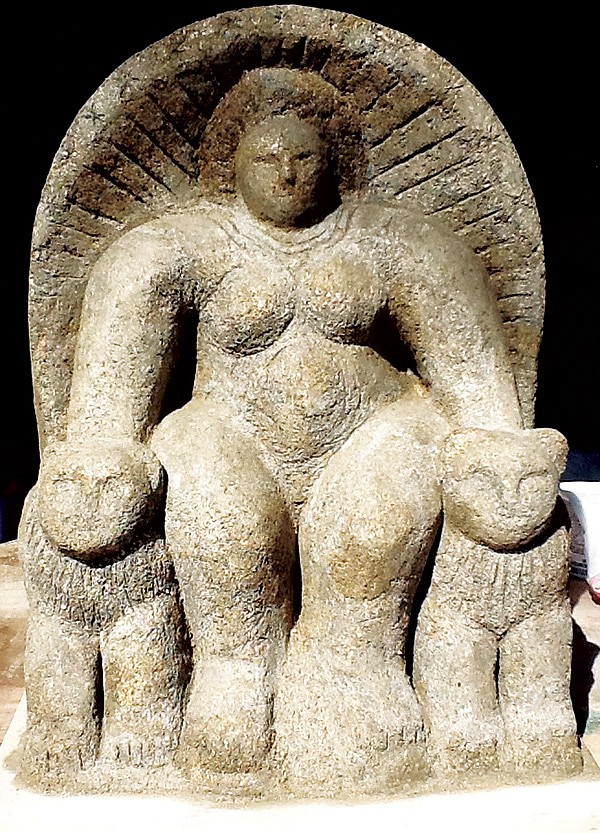March 20 marks the beginning of spring. It’s a time for coming out of the darkness, reawakening, fi nding renewed energy and planting the seeds of new beginnings, either literally or metaphorically.
For those who practice earth-based spirituality in Northwest Arkansas, it’s also time for the Goddess Festival, a gathering of the clans, so to speak, to share their faith with each other and the public.
The festival is built on that circle of sharing, whether the topic is drumming or spirituality in the workplace, said Vick Kelley, one of the founders of the 5-year-old event.
The 2013 theme is “Restoring the Balance,” and that means exploring the feminine divine in art, music, writing, reading, meditation and more. While the focus might change from year to year, one idea is constant.
“We’ve never had a keynote speaker,” Kelley said.
Everyone participates as much as they wish, she explained, bringing their expertise and energy to the table harmoniously. What each one takes away, however, is very individual.
REVEALING ROOTS
On Monday, four of the founders of the Goddess Festival and one “enthusiastic participant” gathered at a Fayetteville coftee house to discuss their faith. Chava Schacter of West Fork is of Jewish descent but now considers herself pagan, while also attending Unitarian Universalist Fellowship.
Her partner, Beverly Toll, was raised in the Baptist church but now shares Schacter’s spiritual beliefs.
Kelley was raised Catholic but rejects any organized religion, be it Christian or pagan. “It’s too close to the pain that came to me in the church,” she said.
Diana Rivers, the matriarch of the group and the first one to suggest a Goddess Festival, considered herself an atheist when she was younger, she said.
“There were only two choices, and I knew I wasn’t Christian. Pagan was not on the menu.”
DeLani Bartlette, a Fayetteville native who was raised as a Jehovah’s Witness, wasn’t around for the founding of the festival, but she shares the same story of discovery. She disliked the patriarchal structure of most Christian churches.
She felt closest to God when she was outdoors. And she said the fi rst time she was part of a pagan ritual, she felt as though she’d come home.
The women may diverge in their definition of “God,” but the same concepts kept coming up in their discussion.
“I really don’t see God as an allpowerful individual,” Schacter said. “If I have a concept of deity at all, it’s the connection between all things.”
“We’re all part of the web,” Bartlette agreed.
“It’s all about restoring the balance,” Schacter said of the Goddess Festival.
“Our culture feels too lopsided.”
“I am so vehemently unstructured and independent, I don’t wear the labels of ‘pagan’ or ‘Wiccan,’” Kelley said. “I shy away from anything that has a format.
My whole commitment to the Goddess Festival is balance.”
“I find it interesting that it’s ‘God the father’ and ‘God the creator,’ but every mammal on this planet - including us - is born from a woman’s body,” Rivers said.
“I grew up in rural Mississippi and never heard the word ‘goddess,’” Kelley chimed in. “I’m putting that word out there for the sake of my grandchildren.
They need to hear the word. It’s the rest of the story.”
Rivers said the shifts from women as healers and women as the center of the household helped create the imbalance the Goddess Festival seeks to address.
The festival also brings together solitary practitioners of their faith and those who have yet to defi ne their beliefs.
“You can’t believe how many people come in with this shocked look of ‘I have found my people,” Kelley said.
BUILDING RITUAL
Among the first events of the festival, which opens Friday, is a planning session to create the spring equinox ritual. Cynthia Huelsmann will be the “coordinator,” but it’s a term she uses loosely. The participants will build the ritual, she said. “Last year, everybody brought herbs, and we combined them all in a big cauldron,” she remembered, “then everybody took from the cauldron at the end,” and planted what they took.
“It’s creating community,” she said, in addition to celebrating spring and thanking the earth-related gods and goddesses for safe passage through the winter.
Ritual, Huelsmann said, is as individual as the practitioner. For her, it always includes chanting and fire, and it most often happens outdoors.
The idea, she said, is to bring back “the peace that indigenous people have because of their connection to the earth, to animals and nature.”
Huelsmann said she walks every day, and she chants on every walk.
“I have a chant for every occasion,” she said. “I integrate my breathing with my singing, and it grounds me.
Whatever I’m doing, if I’m in the garden, I’m singing a song there. If I visit a friend that’s dying, I’m singing a song there.
“Ritual is part of everyday life, absolutely. But it’s better at the special times, the holidays like spring equinox.”
Teresa Honey Youngblood, director of religious education for the Unitarian Universalist Fellowship in Fayetteville, said her congregation celebrates the elements that the spring equinox and Easter share.
“The common elements of the new beginnings and the opportunity to reflect on what it is we want to do difterently this time around span the Christian, pagan and UU perspective,” she said.
“From the Unitarian Universalist perspective, which has a Judeo-Christian heritage and then a more modern acceptance of the earth-based religions as an important source of wisdom, celebrating the two together and recognizing their mutual infl uence is a neat way to approach this time of year from a 21st century perspective.”
Religion, Pages 6 on 03/09/2013

